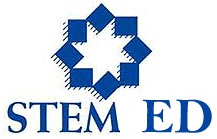Video feed @ www.edutopia.com
Process teaching will be the cornerstone of the STEM science program. Are there curriculum projects in Earth Science, Biology, Chemistry and Physics available to provide a rigorous program of study that is right out of the can? Should we develop our own programs of study?
Modeling Projects
What is STELLA?- STELLA is a flexible computer modeling package with an easy, intuitive interface that allows users to construct dynamic models that realistically simulate biological systems (visit the High Performance System website for more information). Given the combination of ease of use and modeling power, the STELLA system is ideal to interface with student investigative experiences. In its most basic form, modeling in STELLA proceeds in three steps: constructing a qualitative model, parameterizing it, and exploring the model's dynamics.
STELLA Models developed at Williamsport High School in Maryland
STELLA Models developed at Williamsport High School in Maryland
Modeling Across the Curriculum is a five-year research project to study the impact of computer modeling tools on secondary-level science learning. Partners in the project include the Concord Consortium, Harvard University, Northwestern University, the Center for Learning Technologies in Urban Schools (LeTUS), the Fitchburg Public Schools, the Boston Public Schools, and the Lowell Public Schools. Modeling Across the Curriculum is funded by the Interagency Education Research Initiative (IERI), a jointly supported project of the National Science Foundation, the US Department of Education and the National Institute of Child Health and Human Development, under NSF Grant No. REC-0115699.
Netlogo is a cross-platform multi-agent programmable modeling environment. NetLogo was authored by Uri Wilensky in 1999 and is under continuous development at the CCL (the people who brought you StarLogoT). NetLogo also powers the HubNet participatory simulation system. NetLogo is free of charge. For a fuller description, click here.
The Concord Consortium is a nonprofit educational research and development organization based in Concord, Massachusetts. We create interactive materials that exploit the power of information technologies. Our primary goal in all our work is digital equity — improving learning opportunities for all students.
Free model-based learning and modeling software - We are delighted to be able to offer a growing collection of free software and student materials that use this software. Finding it is a bit of a treasure hunt. Sorry. The software is being developed in different projects, so we have not collected it all in one place. The following describes the major places to look.
MIT Open Courseware for STEM
- For Teachers
Our goal is to make it easy for you to find resources you can use to inspire your students.- We've selected a range of materials to help you:
- Show science demonstrations by MIT faculty in your classroom.
- Provide alternate explanations to reinforce key concepts.
- Guide students to additional homework problems and exam examples.
- Add to your knowledge.
- You can use this site to help your students:
- Understand concepts by watching video demonstrations.
- Study for AP exams.
- Sample the kind of work they'll be doing in college.
For Students- Highlights for High School is your guide to MIT courses selected specifically to help you prepare for AP exams, learn more about the skills and concepts you learned in school, and get a glimpse of what you'll soon study in college.
- Need a break from studying?
- Check out videos of competitions at MIT like the Solar Decathlon. Ever see a bullet smash through a rose dipped in nitrogen? Check out the Strobe Project Laboratory. Studying for the Physics AP exam? Watch an MIT professor explain pendulums by swinging across his classroom.


